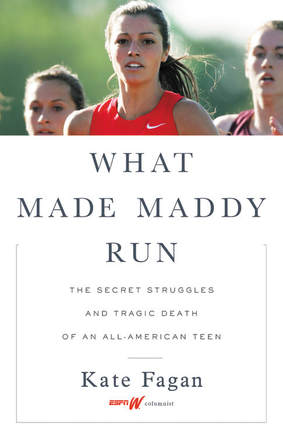 One of the high school runners I coach is hobbling through her second 1000 meter interval. Tears are streaming down her red cheeks as she struggles. I pull her off and give some words of encouragement. We talk about her painful knee. She goes to the trainer, we develop a plan to get her well, and she's back racing happily in a week. Another girl strides effortless through the park, clipping target times in intervals with ease. She finishes, I give her encouragement--tell her she looks fantastic. Little do I know this girl is hobbling inside. Overwhelmed by the stress of keeping her top spot on the team, the load of 5 AP classes, and the fear of gaining weight and growing hips that will slow her down in the future, she suffers from depression. In a constant state of worry about disappointing herself, her parents, friends, coaches, and whomever else is spectating her life, she is consumed by a race she fears she'll never win. Mental issues are often the most invisible injuries in sports. I've coached both boys and girls prep running teams for the past 25 years. Each sex has their own unique challenges in regards to running, but in working with female teams, I have found their paths to be most taxing. Most female runners are highly intelligent, highly driven, and emotional. With brains wired to not just succeed, but succeed on the highest level, these girls are satisfied with little that dips below the line of perfection. One may think it's a blessing to be so driven, but in many female runners, it's a wicked curse. In a sport where girls are constantly measured by fitness and the tic of a clock, female runners are highly critical (and judged) not only of their improvement curve, but the curve of their own bodies. I know, I have daughters who run. When Kate Fagan came out with her book What Made Maddy Run: The Secret Struggles and Tragic Death of an All-American Teen this summer, I was encouraged that someone was addressing the mental issues of a female runner. The "All-American" label of a young female runner is in itself often a curse. Nothing conjures up images of perfection, both in looks and performance, than being labeled an "All-American girl." It spawns a self imposed pressure to live up to this lofty ideal, which often leads to depression when things begin to not work out. Oh, and did I mention the jealousy that rears it's head on social media by those critiquing teen peers who love to see the perfect fail? The beauty of high interest nonfiction books is they have the ability to connect with readers through highly intimate stories of another's personal personal struggle. Fagan does just that as she writes about Madison Holleran, a picture perfect girl on the outside with looks, friends, talent, and opportunity abound. On the inside, she is a mess. Struggling with depression that stems mainly from a self-imposed and societal set of standards that are nearly impossible to perfect, she takes her life. Fagan's book is a "must-have" for every high school in the country. It's just that important. While you are at it, buy Amanda Beard's memoir called In the Water They Can't See You Cry. If there is any wish for me as a coach, parent, and librarian, it's that a quietly struggling female athlete will cross paths with Maddy's story, pick it up, and find some guidance from Maddy's spirit. Or maybe a parent will pick up this book and recognize some ever subtle signs from their daughter. Books CAN save lives, and this one fits that category. It just may spark the honest conversation that a female runner needs to have with herself about the issues she may never outrun.
2 Comments
4/9/2021 03:08:40 am
Hindi singers always come of with the out-class lyrics therefore their songs have millions of views on the YouTube. I stream their songs for many hours and never get bore of them..
Reply
Leave a Reply. |
Archives
March 2023
Categories
Categories |
 RSS Feed
RSS Feed